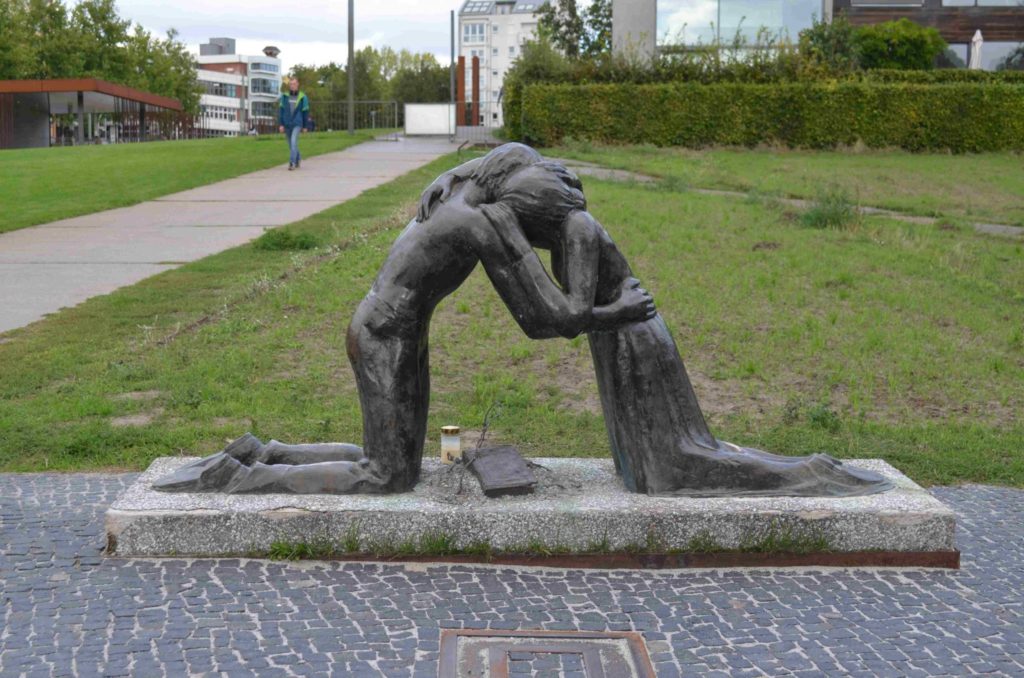
A True Friend
“A true friend,” that’s what Naftali Bennett, Israel’s prime minister, called Angela Merkel during her farewell visit to Israel in October 2021. Merkel had made Germany’s support for Israel a focus of her tenure as Chancellor, calling Israel’s security a matter of German Staatsräson in 2008. Now, during her last visit, she repeated what she meant by that: “Germany can only forge a truly good future in full awareness of its unending responsibility for the break with civilization that was the Shoah.” Later that day, Merkel added that even as it became “increasingly difficult because of the settlements” under no circumstances should one “lose sight of the two-state solution.”
But the two-state solution could not be farther out of sight than when Merkel first took office in 2005. Is that the legacy we would expect of a true friend? Shouldn’t a true friend at least have tried to move Israel closer to ending the occupation and finding peaceful ways forward? Shouldn’t she have used her much-applauded ability to forge compromise by bringing Israelis and Palestinians back to the negotiating table and keeping the two-state solution firmly in sight? Shouldn’t she have made every effort to secure an end to illegal settlements, human rights violations, and violent conflict?
A Moral Triangle
Angela Merkel may be an angel to the many immigrants who named their children after her in gratitude for receiving asylum in Germany post 2015, but with regards to Israelis and Palestinians, her name has not been an omen. This is the case even though—as Katharina Galor and Sa’ed Atshan’s The Moral Triangle: Germans, Israelis, Palestinians so powerfully demonstrates—there were so many opportunities to bring people together right at home in Berlin. Their interviews and analyses, thanks in part to the deep respect they have for each other that is palpable in the book, conjure up a hope that lies in the possibility of what could be if Germans were willing to spend political capital on the issue. If the new German government were to acknowledge that the Shoah and the subsequent creation of the state of Israel have indeed created a triangle that puts a moral imperative on Germans with regards not only to Israelis, but also to Palestinians, many new avenues for rapprochement and restorative justice could be opened up, rather than, as has been the case up to now, sacrificing Palestinian humanity in the name of Vergangenheitsbewältigung [Coping with the Past]. Indeed, there is a lot more Germany could do diplomatically to sanction human rights abuses, for example, in connection with illegal settlements. That said, the book also explains why high-level negotiations or diplomatic advances alone may not succeed. Ultimately, politicians are not able to initiate peace from the top down. Peace can only come from the bottom up. The true peace makers therefore are the artists, entrepreneurs, and activists portrayed in the book. They are those who dare to step across that invisible line that so often prevents people from seeing each other’s humanity. Like Yael Ronen. Like Armin Langer. Like Tarek Al Turk. Like Saleem Ashkar. Like Daniel Barenboim. Clearly, art and activism, but also entrepreneurship and innovation, can bring people together in ways that politics cannot. That said, the new German government should accept the political responsibility and make investing in creative approaches towards reviving the peace process a top priority.
A Missing Link
The moral triangle is missing a link, of course—the two authors only represent two of the three angles. Would the book’s message have changed had there been a third, a non-Jewish/non-Palestinian, German author involved? As a non-Jewish-non-Palestinian German reader, I was initially finding myself trying to resist the idea that the plight of the Palestinians is the Germans’ fault. What about the British? What about Israelis and Palestinians themselves? After all, the authors explain that the large majority of Palestinians living in Berlin today do not actually hail from the West Bank or Gaza, but from surrounding countries. But of course, laying blame is not the purpose of the book. Instead, its purpose is to reignite a difficult conversation despite all the challenges. The result is a dialogue that doubles down instead of going silent when the going gets tough.
Jewish-German Dialogue
The idea that lies behind the dialogue is a beautiful and encouraging one. It is an idea that reminds me of Jewish-German Dialogue group that I took part in when I first arrived at Brandeis University (the only non-sectarian Jewish-founded university in the United States) in 1998. One of the members of this group was my late colleague David Gil, Professor at the Heller School for Social Policy and Management for almost half a century, who passed away this year at the age of 96. David spent his professional life thinking about the theory of social change, the roots of violence and oppression, and how to develop policy strategies to respond to universal human needs. During the Holocaust he had fled Austria, first emigrating to Sweden and then to Israel. Eventually he and his wife Eva settled in the United States. The dialogue group, led by then Rabbi Al Axelrad, met about once a month, as a small circle of Jews and non-Jewish Germans who talked about the Holocaust. Invariably, the conversations in our monthly meetings would reach the topic of Israel, and David never failed to voice his deep dissatisfaction with the treatment of Palestinians. This also invariably incensed one of the other members of the faculty, a Professor of French and son of Holocaust survivors from France. The two of them would then argue while the German participants typically stayed silent. Interestingly, David never turned to the German participants and asked them about Germany’s responsibility for the Palestinians’ plight. Instead, the Germans (myself included) would sit there somewhat uncomfortably, thinking that this seemed more like a Jewish-Jewish and not a Jewish-German dialogue. If Athsan and Galor’s book had been available to us back then, it would have made the German participants realize that the Middle East conflict was their business. It would have confronted them with the realization that their own history was interwoven not only with Israelis’ history, but with the history of the Palestinians as well. And it would have taken quite a bit of the burden off of the Jewish participants, which in turn might have reduced the differences among them.
When I was a child growing up as a Lutheran pastor’s daughter in Germany, I heard about Israelis mainly in church on Sundays, and about Palestinians in conjunction with the RAF terrorists who had briefly trained with Palestinians in Jordan, and who were being chased by police. Their collected mug shots hung in all German post offices, even in the one on the small island in the North Sea where I grew up. My parents told me not to wear an Arafat-shawl like all my friends did. My friends who were wearing the shawls never talked about Israel or Palestine. It was simply the cool thing to wear. We all agreed antisemitism was something the Nazis did against the Jews, and was something that was not supposed to happen ever again. I did not hear the term Nakba until much later. I also never interacted with any living Jews or Palestinians for that matter. This did not happen until I came to the United States in my late twenties.

David was not the only American Jew I have since met who was deeply critical of Israel. In fact, it was among Jews and Israelis in particular that I first heard about the Nakba. Thirty years ago it was a constant topic of discussion. Everyone placed “Shalom, Haver” stickers on their cars after Yitzhak Rabin was shot.[1] The saddest part of the book, therefore, is the fact that so many of the interlocutors were afraid of being identified, especially for speaking on behalf of Palestinians. The fact that there is “censorship of voices that support Palestinians” (150) in Germany is more than an unfortunate set of circumstances. It is indeed immoral. Galor and Atshan show that this dialogue, if approached with respect and empathy, is indispensable. They show that it is possible to be in solidarity with Israelis and Palestinians—that is, with the people on both sides who care for true friendship and true peace.
A New Start and a Traffic Light
Angela Merkel’s departure should be an opportunity in this regard: A new German “traffic light” coalition government that includes the Green Party should finally dare to assume a more active role vis-a-vis Israel/Palestine. Although foreign policy played hardly any role in the German elections this year, the Greens do have a clause about peace and human rights in their party platform which says that they want to pass a law to prevent arms sales to conflict regions in general. Those in Israel who fear their influence may not like this part of their platform, but they should feel comforted that Merkel’s sentence about Israel’s security being part of Germany’s Staatsräson can be found verbatim in the Green Party’s election campaign platform. It also says there that “the existence and security of Israel as the national home of the Jewish people with equal rights for all its citizens is non-negotiable” (my translation). The party condemns threats to the state of Israel and its sovereignty. There is no mention of Palestinians, but there is explicit criticism of “escalation of violence as well as measures contrary to international law such as the annexation of occupied territories or the continued expansion of settlements” for standing in the way of a peaceful political solution to the conflict and an end to the occupation. Prominent Greens have also positioned themselves strongly against the Boycott-Divestment-Sanctions (BDS) movement. Like Merkel, the Greens express support for a two-state solution on the basis of the borders of 1967. That certainly does not sound like a desire to stake one’s political future on a renewed commitment to peace in the Middle East. Ending the sale of submarines and fossil fuel contracts should be combined with a new German diplomatic offensive in the region focused on addressing human rights violations and wooing both Israelis and Palestinians back to the negotiating table with improvements in ecological agriculture, green energy, and innovative climate solutions for the entire region. Berlin should extend an invitation to the peacemakers on both sides and become—both physically and metaphorically—the place for a renewed peace process that centers the needs of the people on the ground. This would be in keeping with what Galor and Atshan envision, i.e. that “Israelis and Palestinians have the potential to create together a joint foundation of Israeli and Palestinian cultures that exist both separately and in an interwoven manner in a postcolonial context” (147). As stated above, this vision also allows for our Jewish-German Dialogue conversations to get un-stuck, and to develop new ways of speaking about Israel and Palestine, about antisemitism in all its facets, as a German responsibility. In addition to enjoying falafel and Klezmer music, Germans should encourage and facilitate uncomfortable conversations to show they have truly learned something from their many decades of Vergangenheitsbewältigung. Because that’s what friends are for.
[1] “Shalom, haver” = “Goodbye, friend” is how President Bill Clinton referred to Israel Prime Minister Yitzhak Rabin in his eulogy.

